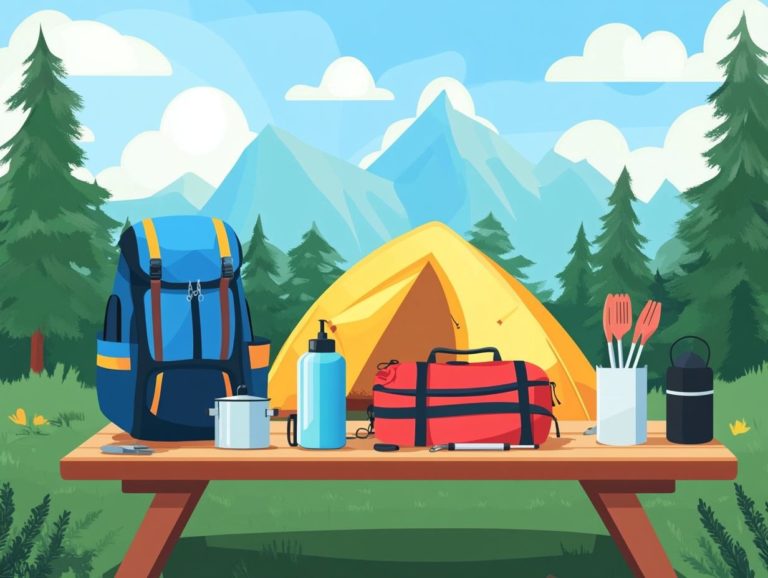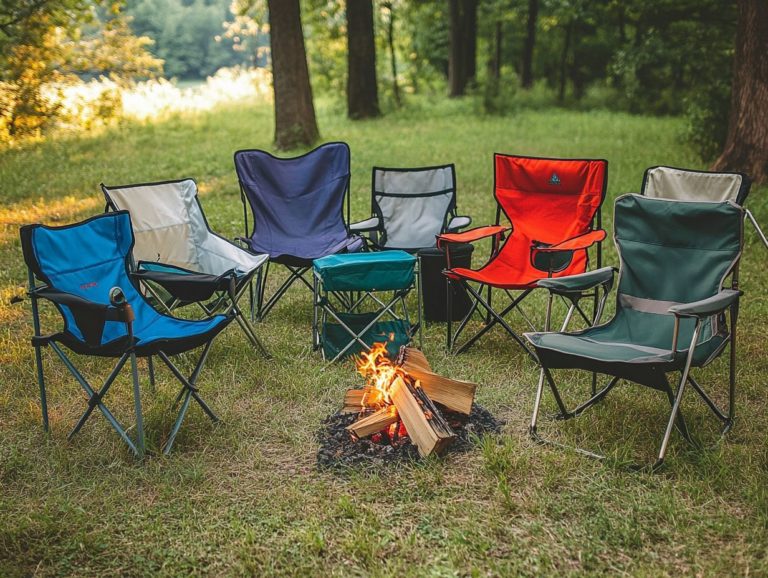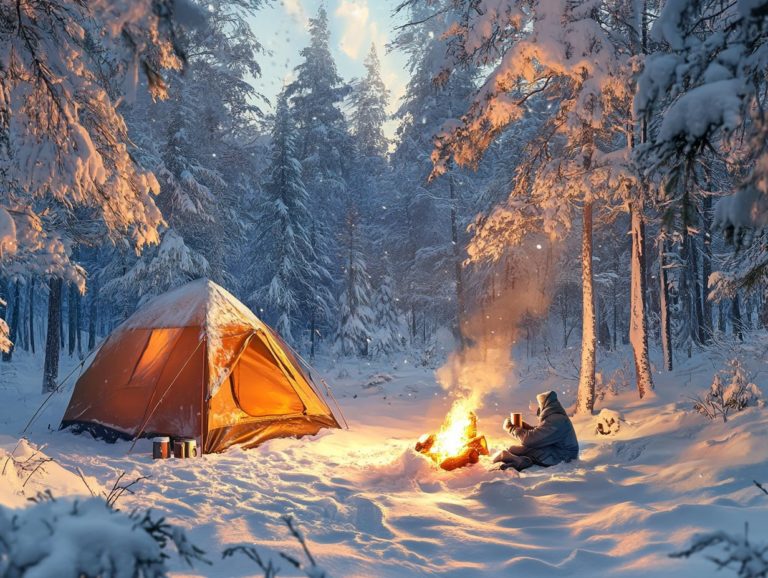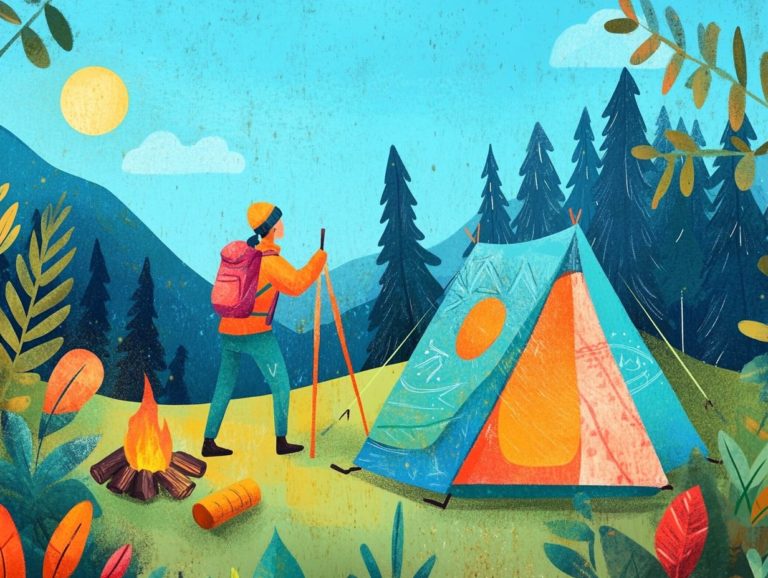Essential First Aid Gear for Camping
When you venture into the great outdoors, adventure beckons, but so do potential mishaps. Whether you find yourself hiking rugged trails or savoring a tranquil evening by the campfire, having the right first aid gear can transform your experience, ensuring safety and peace of mind.
This article delves into the essential items every camper should consider packing, ranging from basic first aid kits to specialized supplies tailored for specific injuries. Get ready to customize your kit for the ultimate outdoor adventure!
Prepare to arm yourself with the knowledge necessary to embrace your camping trip with unwavering confidence!
Contents
- Key Takeaways:
- 1. First Aid Kit
- 2. Antibacterial Ointment
- 3. Bandages and Gauze
- 4. Adhesive Tape
- 5. Antiseptic Wipes
- 6. Tweezers and Scissors
- 7. Pain Relievers
- 8. Insect Repellent
- 9. Sunscreen
- 10. Emergency Blanket
- 11. Instant Cold Pack
- 12. Snake Bite Kit
- 13. Burn Cream
- 14. Emergency Whistle
- 15. First Aid Manual
- What Are the Most Common Injuries While Camping?
- Frequently Asked Questions
- What must-have first aid gear do I need for camping?
- Why is it important to have first aid gear while camping?
- Where can I find a first aid kit for camping?
- What types of bandages should I include in my first aid kit?
- Can I bring my own prescribed medications in my first aid kit for camping?
- Do I need to restock my first aid kit after every camping trip?
Key Takeaways:
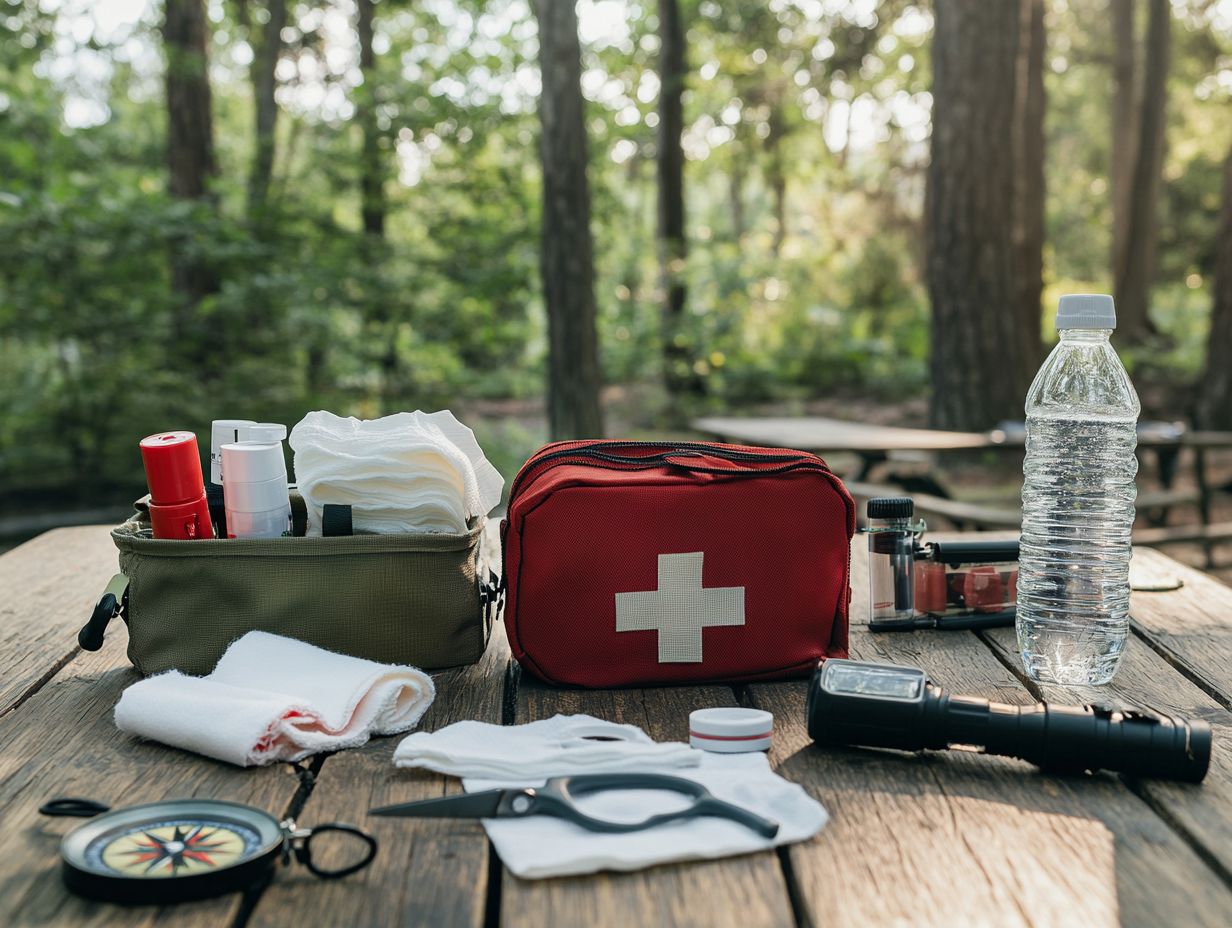
- Always bring a first aid kit specifically tailored for camping to address common injuries such as cuts, scrapes, and insect bites.
- Include items like antiseptic wipes, pain relievers, and an emergency whistle for added safety in case of emergencies.
- Consider the specific needs of your camping group, such as allergies or chronic conditions, when customizing your first aid kit.
1. First Aid Kit
A well-equipped first aid kit is essential for your camping adventures, especially when you’re venturing into the great outdoors. It prepares you for unexpected accidents and addresses your medical needs effectively.
Whether you’re hiking the stunning trails of the Colorado Rockies or enjoying a cozy family camping trip, having access to emergency supplies like adhesive bandages, antihistamines, and pain relief medications can significantly enhance your experience.
Camping exposes you to various injuries, from minor cuts to allergic reactions. That’s why a comprehensive kit is vital. Experts like Paul Auerbach and William Forgey stress the importance of being ready for whatever nature might throw your way.
Your essential items should include:
- Antiseptic wipes
- Gauze pads
- A digital thermometer
- Tweezers for splinter removal
Don t forget to consider personal medications, such as epinephrine auto-injectors for severe allergies. By assembling a robust first aid kit, you can embrace your outdoor experiences with greater peace of mind, knowing you re prepared for any situation that arises.
2. Antibacterial Ointment
Antibacterial ointment is important for stopping infections from those minor cuts and scrapes that tend to happen during outdoor adventures. When paired with antiseptic wipes, you have a solid wound care strategy in place.
This duo becomes crucial in nature, where the likelihood of encountering dirt and bacteria ramps up significantly. By maintaining proper hygiene on your camping trips, you re not just preventing infections; you re also improving your overall health, allowing you to fully enjoy your adventures.
3. Bandages and Gauze
Bandages and gauze pads are critical components of your camping first aid kit. These essentials come in various types, from adhesive bandages for pesky cuts to larger gauze pads for significant wounds.
It’s prudent to create a thorough checklist that includes:
- Adhesive tape
- Blister pads
This ensures you’re well-equipped for any unexpected mishaps. Including items like instant cold packs and pain relievers can be a game changer, addressing a wide range of potential issues, from insect bites to sprains.
Don t wait! Prepare your first aid kit now and start packing your gear today. Go explore the great outdoors with confidence!
4. Adhesive Tape
Adhesive tape is a critical addition to your camping gear. It showcases versatility in a myriad of situations, from securing bandages to addressing emergencies with camping supplies.
Its value is truly immeasurable, especially in unexpected predicaments where quick fixes are paramount. For instance, if a rip occurs in your tent due to inclement weather, a reliable tape can serve as an effective patch, enabling you to remain dry and secure throughout the night.
In first aid scenarios, adhesive tape is essential for stabilizing dressings or splints. It ensures that injuries are properly supported until professional assistance is available. When assembling your first aid kit, prioritize high-quality medical adhesive tape alongside fabric tape. Fabric tape adapts seamlessly to body contours, providing necessary support without compromising comfort as you move.
5. Antiseptic Wipes
Antiseptic wipes are an essential addition to your camping first aid kit. They offer a straightforward and effective means to clean wounds and prevent infections while you re out in nature.
Staying clean in the wild is very important, as it directly influences your overall health and safety. These wipes are perfect for addressing minor cuts and scrapes and also serve as a convenient solution for cleaning your hands after handling food. This ensures that harmful bacteria don t sneak into your meals.
For optimal effectiveness, use them before cooking and after visiting communal facilities. Bring a resealable bag for used wipes to manage waste responsibly and keep the camping environment pristine.
Remember, maintaining cleanliness not only enhances your personal health but also elevates your overall outdoor experience.
6. Tweezers and Scissors
Tweezers and scissors are essential companions in your first aid kit. They make it easier to tackle a variety of camping scenarios, whether it’s removing splinters or cutting bandages with ease.
These tools are lifesavers for minor injuries and come in handy during meal prep. They allow you to snip twine or slice through packaging quickly. Imagine your friend getting a thorn lodged in their hand a reliable pair of tweezers can truly be the hero of the moment, ensuring quick and safe removal.
When choosing these tools for your trip, opt for stainless steel tweezers for their durability. Select a versatile pair of scissors that can handle everything from first aid to food preparation. This way, you’ll be well-equipped for any winter camping adventures that come your way.
7. Pain Relievers
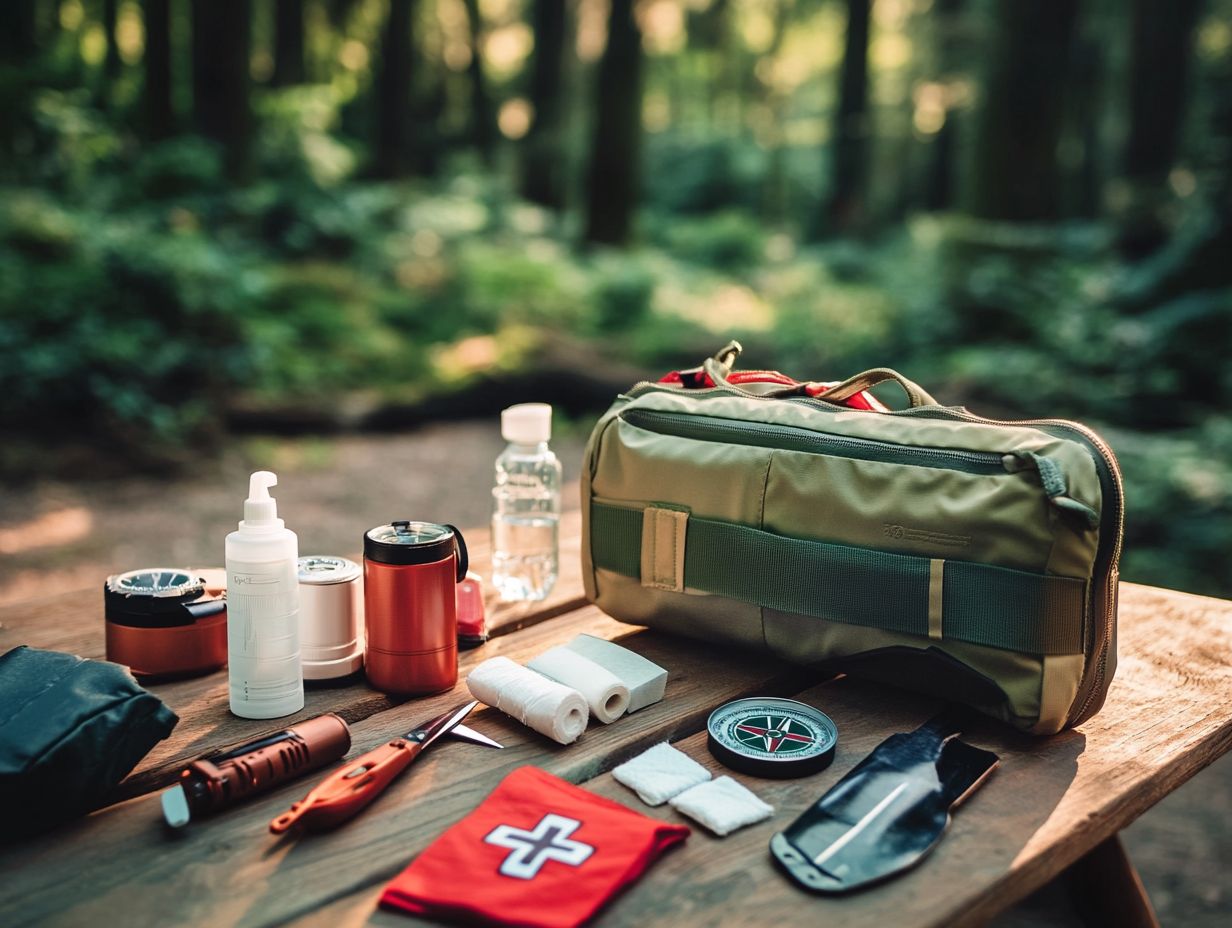
Pain relievers are an essential addition to your camping first aid kit. They offer much-needed relief for headaches, muscle soreness, or any discomfort you might encounter during your outdoor excursions.
In the great outdoors, where nature s unpredictability can lead to unforeseen aches and pains, being prepared with the right medications is key. Consider options like ibuprofen, which reduces pain and inflammation. If you prefer a gentler approach, acetaminophen serves as a suitable alternative for those with sensitivities.
Know what you need! Understanding your medical needs makes your trip safer and more enjoyable. Some may require specific medications or have allergies that could complicate treatment. Always consult a healthcare professional before your trip to ensure you’re equipped with the safest and most effective options for your journey into the wild.
8. Insect Repellent
Insect repellent is an essential companion for your camping trips. It allows you to immerse yourself in the beauty of the great outdoors without the irritation and potential health concerns that pesky insects bring along.
You ll find a range of insect repellents on the market, including sprays, lotions, and wipes. Each offers varying degrees of effectiveness against different pests. For instance, DEET-based products are well-known for their potency against mosquitoes. Natural alternatives like citronella and eucalyptus oils provide a more chemical-free option for those who prefer a gentler approach.
To ensure your safety while enjoying nature, incorporate insect repellent into your camping checklist. Apply it before you set off on hikes and refresh it throughout the day, especially in the early morning and evening when insects are most active. Plan ahead to make the most of your outdoor adventure!
9. Sunscreen
Sunscreen is absolutely essential for safeguarding your skin during camping trips. Unprotected exposure to the sun can lead to painful sunburns and long-term skin damage.
Selecting the right SPF (sun protection factor) tailored to your skin type and the duration of your activities is crucial. It provides strong protection against harmful UV rays that can get through your skin even on seemingly innocent overcast days. Apply it generously to all exposed areas, particularly your ears, nose, and feet.
Reapply every two hours, or even more often if you re swimming or sweating. This dedication enhances your outdoor safety while you’re hiking, fishing, or just lounging at camp. It allows you to immerse yourself in the adventure, creating lasting memories without worrying about skin issues.
10. Emergency Blanket
An emergency blanket is an essential addition to your camping first aid kit. It offers warmth and protection during those unexpected moments that outdoor adventures can throw your way.
These versatile blankets, typically made from heat-reflective materials, serve multiple purposes that are invaluable for your wilderness safety. They not only keep your body heat intact in chilly conditions but also provide a protective barrier against wind and rain, ensuring you stay dry and warm.
In emergencies like injuries or sudden weather changes an emergency blanket can be a lifesaver. Its reflective surface can also double as a signaling device, making it easier for rescuers to spot you if you re in distress.
Ultimately, mastering the effective use of this crucial tool could be the deciding factor in a survival scenario.
11. Instant Cold Pack
An instant cold pack is a must-have in your camping first aid kit. It provides swift relief for injuries like sprains or strains that might happen during your outdoor adventures.
The importance of immediate care for these injuries can’t be overstated. Addressing pain and swelling promptly paves the way for a smoother recovery. Whether you’re hiking, biking, or engaged in any sport, having an instant cold pack at your disposal can dramatically ease discomfort.
This simple yet powerful tool numbs the affected area, constricts blood vessels to reduce swelling, and offers comfort. Just a few minutes with an instant cold pack can prevent further damage, ensuring that a day of enjoyment in the great outdoors doesn t turn into a painful experience.
Bring your insect repellent and sunscreen to ensure a fun and worry-free camping trip! Gear up, stay safe, and enjoy every moment of your outdoor adventures!
12. Snake Bite Kit
A snake bite kit is essential for your first aid supplies when camping in areas where snake encounters might happen. Being prepared for emergencies can make a significant difference.
This kit is vital. It usually includes:
- A suction device to help extract venom.
- Antiseptic wipes to clean the bite area.
- A pressure bandage to help stop bleeding.
- A pair of gloves to maintain hygiene.
Having these tools ready can significantly enhance your response to a snake bite, ensuring quicker access to professional medical help.
As a thoughtful camper, stay vigilant by wearing protective footwear, avoiding tall grass, and making noise to alert snakes of your presence. This helps minimize the chances of an encounter.
In the unfortunate event of a bite, remember to remain calm, immobilize the affected area, and seek immediate medical assistance.
13. Burn Cream
Burn cream is a must for your camping kit. It provides relief from burns and helps you enjoy outdoor cooking safely.
When preparing meals over an open flame or using a portable stove, the risk of accidents increases. Having burn cream available is crucial.
This topical solution eases pain, soothes the skin, and promotes healing. This way, you can keep enjoying your outdoor activities without lasting discomfort.
By including burn cream in your gear, you ensure a safer cooking experience, reducing the risk of serious injury and creating a more enjoyable atmosphere around the campfire. Knowing you re well-prepared instills confidence in your cooking endeavors, enhancing your overall camping adventure.
14. Emergency Whistle
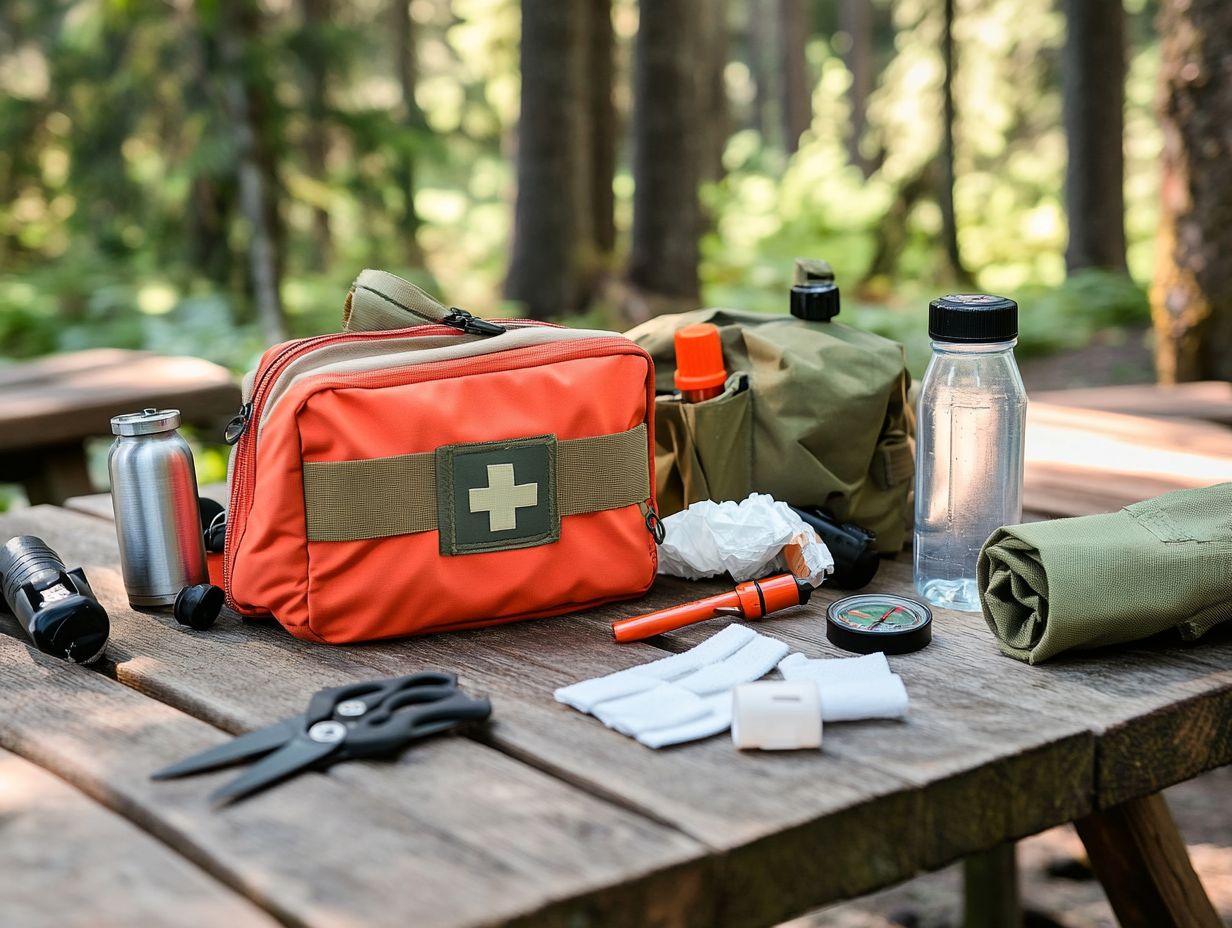
An emergency whistle is vital for camping. It helps you communicate in emergencies or when lost in the wilderness.
This small yet powerful device can cut through the ambient noise of nature, making it easier for nearby hikers or rescuers to hear you.
In unexpected situations like an injury or getting separated from your group blowing a whistle is a straightforward way to signal for help without draining your energy.
Unlike shouting, which can strain your voice and may not carry far, the sound of a whistle travels impressive distances. This ensures that anyone within earshot can easily recognize your call for assistance. Keeping this simple precaution handy greatly improves your chances of a safe and swift rescue.
15. First Aid Manual
A first aid manual is your critical companion as a camper. It offers key guidance for treating injuries you may face outside.
In moments when professional medical assistance is hours away, this manual becomes your lifeline. It provides you with the confidence and knowledge to navigate emergencies effectively.
Essential information should include protocols for treating cuts, burns, insect bites, and allergic reactions, along with instructions for addressing serious situations like fractures or hypothermia.
Comprehensive illustrations enhance your understanding, allowing for quick reference during high-stress moments. Having a list of necessary supplies and a plan for contacting emergency services can significantly increase your chances of a successful response, ensuring your safety and well-being throughout your outdoor adventure.
What Are the Most Common Injuries While Camping?
Understanding the most common injuries that can occur while camping is essential for you as an outdoor adventurer. This knowledge not only prepares you to handle emergencies effectively but also elevates your overall camping experience.
For instance, you ll often encounter cuts and scrapes from navigating rough terrain or sharp objects. Burns can sneak up on you too, especially if you re handling hot cooking gear or campfires without the right precautions. Insect bites are another frequent nuisance, leading to discomfort or even allergic reactions if not addressed promptly.
To mitigate these risks, consider the following steps:
- Pack a well-equipped first aid kit
- Wear appropriate clothing
- Familiarize yourself with your surroundings
By applying insect repellent and practicing fire safety, you can significantly lower the chances of injuries, paving the way for a more enjoyable and worry-free outdoor adventure.
How Can a First Aid Kit Be Customized for Specific Needs?
Customizing a first aid kit to meet your specific needs is essential for enhancing your readiness while camping. Tailoring your kit helps you meet specific health needs and handle emergencies.
Consider the activities you have planned, whether it’s hiking, biking, or swimming, and tailor your kit to include essentials that will be particularly beneficial. For instance, if you’re gearing up for a long trek, you might want to include blister treatments; or if you’re near water, aquatic first aid supplies. Additionally, make sure to check out the top features to look for in camping gear to ensure you’re fully prepared.
It’s equally important to assess any pre-existing medical conditions of your group and ensure your kit is stocked with necessary medications or specialized items for allergies, asthma, or other health concerns. Additionally, having the right essential hiking gear for beginners is crucial. This proactive strategy not only boosts your safety but also instills confidence among campers, knowing they are well-prepared for any unexpected situations that may arise.
What Are the Essential Items for a First Aid Kit for Camping?
When you’re gearing up for a camping trip, knowing which essential items to pack in your first aid kit can significantly enhance your safety and readiness for any injuries that may arise.
A well-stocked kit gives you the power to handle everything from minor cuts and scrapes to more serious ailments, allowing you to fully embrace the beauty of the great outdoors with peace of mind. Make sure your basic supplies include essential items for your adventure, such as those found in our guide on essential gear for a successful backpacking trip:
- Adhesive bandages
- Antiseptic wipes
- Gauze pads
- Tweezers
- Scissors
Once you ve curated your first aid kit, it s time to craft a comprehensive camping checklist. This checklist is crucial; it ensures nothing slips through the cracks, covering everything from cooking supplies to sleeping gear. With this organized approach, you can focus on enjoying your adventure instead of stressing over forgotten essentials.
How Can One Be Prepared for Emergency Situations while Camping?
Start your adventure with careful planning. Being well-prepared for emergency situations while camping is essential for ensuring your safety and effectively managing any incidents that may arise during your outdoor adventures.
Your preparation includes mapping out your route and informing someone about your itinerary and expected return times. Having a comprehensive first aid kit that’s fully stocked can make a significant difference when treating injuries or ailments in remote areas. Additionally, knowing what to do in case of camping emergencies can further enhance your safety while enjoying the great outdoors.
Familiarizing yourself with wilderness safety principles like understanding weather patterns, recognizing animal behavior, and knowing how to create a distress signal gives you the power to tackle unexpected challenges with confidence. Taking the time to mentally prepare for potential scenarios provides peace of mind, allowing you to immerse yourself in the beauty of nature without the burden of constant worry.
Don’t wait plan ahead to enjoy the great outdoors safely!
What Are the Important Factors to Consider When Choosing First Aid Gear for Camping?
Choosing the right first aid gear for your camping adventure involves considering several important factors to ensure you’re fully prepared for any medical needs or emergencies.
First, think about the specific location of your campsite. If you re heading to a remote area, you ll want a more comprehensive supply compared to a site that’s just a stone’s throw away from medical facilities.
Also, think about the activities you have planned. Whether it’s hiking, swimming, or climbing, each comes with its own set of unique risks that will dictate the necessary items.
Don t forget about the size of your camping group. Larger gatherings may require multiple kits or specific items geared towards common injuries that could arise. With the right gear, you ll tackle outdoor challenges with confidence!
Frequently Asked Questions
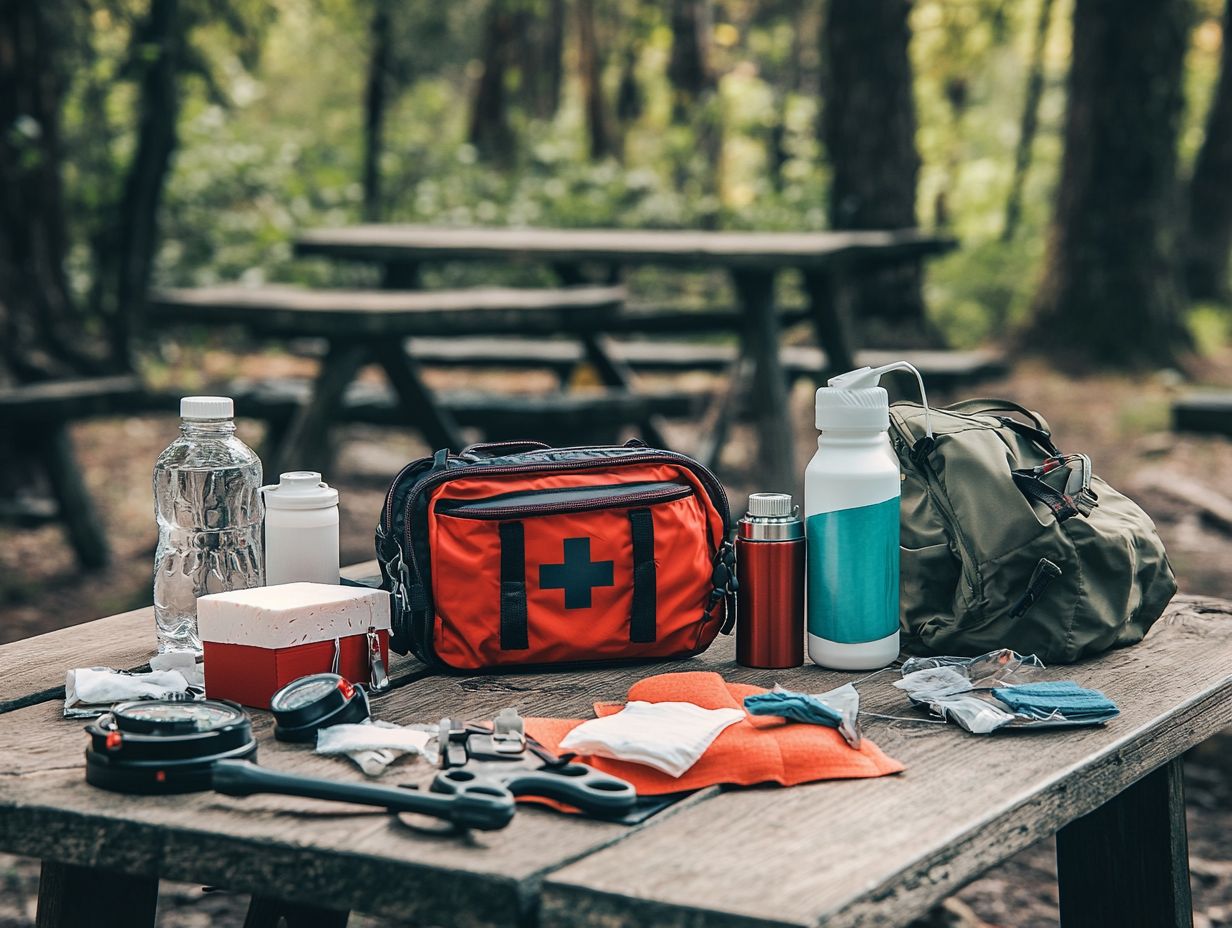
What must-have first aid gear do I need for camping?
The essential first aid gear for camping includes a first aid kit, bandages, gauze, antiseptic wipes, ibuprofen, tweezers, sunscreen, and insect repellent.
Why is it important to have first aid gear while camping?
First aid gear is vital while camping because it allows you to quickly and effectively treat any injuries or illnesses that may occur outdoors.
Where can I find a first aid kit for camping?
You can find first aid kits specifically designed for camping at outdoor and camping stores, as well as online retailers.
What types of bandages should I include in my first aid kit?
It is recommended to include adhesive bandages, which are used for small cuts; gauze pads, for larger wounds; and elastic bandages for support. Don’t forget 3M Micropore Medical Tape for enhanced wound care.
Can I bring my own prescribed medications in my first aid kit for camping?
Yes, include any prescribed medications in your first aid kit for camping, such as an EpiPen. Make sure to bring the necessary dosage information and instructions for use.
Do I need to restock my first aid kit after every camping trip?
It is advisable to check and restock your first aid kit after every camping trip to ensure that all supplies are up-to-date and not expired.


